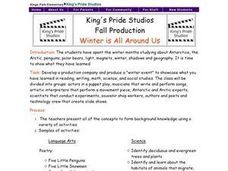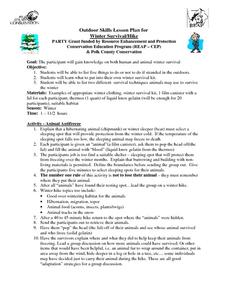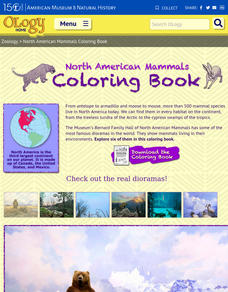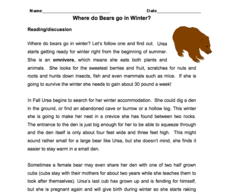ARKive
Seasons in the Woods
Winter in the cold Northwoods of Wisconsin can be hard on animals that aren't adapted to the climate. Investigate the animals that are out and about even in the coldest winter temperatures as you and your class examine animal...
ARKive
Animal over Winter
Gosh those polar regions can get cold. So, how do the animals that live there survive the long winters? Learners explore how animals adapted to survive harsh wintry conditions by completing a worksheet and comparing animal survival...
Curated OER
Winter is All Around Us
Students present what they have learned on Antartica. Students identify deciduous and evergreen trees and plants; identify and study about the habitats of animals that migrate, hibernate, and adapt; study the Aurora and Aurora Borealis...
Curated OER
Read Aloud Lesson Plan: Water for One, Water for Everyone
Students listen to a read aloud about African animals as they access a watering hole. They discuss the characteristics of Africa such as the temperature, it distance from the students, and lifestyle of the animals. They talk about how...
Polk County Education
Winter Survival/Hike
Hibernation isn't just about staying fed, it's about staying warm. Young environmentalists explore the importance of staying warm in the wilderness with a short lesson about surviving in the wild. Using gelatin to represent warm-blooded...
PBS
Reading Adventure Pack: Sleep
A reading adventure pack features two stories—Time to Sleep by Denise Fleming and Animals Don’t Wear Pajamas by Eve Feldman. In response to reading the fiction and nonfiction texts, scholars create a dreamcatcher, discuss hibernation,...
Virginia Department of Education
Weather Patterns and Seasonal Changes
Get your class outside to observe their surroundings with a lesson highlighting weather patterns and seasonal changes. First, learners take a weather walk to survey how the weather affects animals, people, plants, and trees during...
A to Z Teacher Stuff
Word Search Match
Go beyond a traditional word search with a clue matching, word search combo. Scholars read clues, write the word that matches, then search for the word in a puzzle. Clues and words offer insight into the life of polar bears.
American Museum of Natural History
North American Mammals Coloring Book
Seven pages offer scholars the opportunity to learn about North American mammals and boost their coloring skills. Animals include brown bears, beavers, jackrabbits, wolves, jaguar, and Dall sheep
Worksheet Web
Where do Bears go in Winter?
Do bears really sleep for an entire season? Six multiple choice questions and a drawing activity make up a worksheet that tests scholars' comprehension skills after reading about bears during winter.
Curated OER
Animals, Soil, Trees
Fourth graders describe the various kinds of soils and how plants and animals are affected by them. They describe the baic needs of plants, scoring at least a 3 or 4 on a 4-point rubic. Students are able to predict and/or infer what...
Curated OER
Hibernating Hoopla
Pupils simulate hibernation with their stuffed animals. They predict the length of time of hibernation and type their math journal entries about sorting, graphing and draw pictures. They read bear hibernation stories.
K5 Learning
All About Bears
Want to know all about bears? Read a passage about the way they look, how they live, and their lifestyles. The reading passage is followed by questions that ask what baby bears are called and in what ways some bears are different,...
Curated OER
Wildlife Conservation I
Focusing on the wildlife in their area, learners identify endangered and threatened species and what these animals need to survive. While this lesson involves animals in the Long Island area, it could be adapted for use with any area.
Curated OER
Winter
Students explore the concept of hibernation. In this winter lesson, students read Time to Sleep by Denise Fleming and discuss the content of the story. Students participate in classroom activities that require them to develop their...
Curated OER
Habitats
Students identify butterfly habitats. In this butterfly habitats lesson, students read and discuss Where Butterflies Grow. Students study pictures and guess which are butterfly habitats. Students list the life needs of butterflies and...
Curated OER
Exploring Animal Habitats: Winter Changes
Students explore animals during the winter months. They discuss the changes that animals make during winter in order to survive. Students discuss migration, hibernation, and staying active during winter months. Students create various...
Curated OER
A Long Winter's Nap
Students explore the process of estivation, hibernation and torpor and the ways that frogs adapt to seasonal weather changes.
Curated OER
Behavior Adaptations
In this behavior instructional activity, students review different types of behavioral adaptations including migration, hibernation, and communication. This instructional activity has 10 matching and 10 true or false questions.
Curated OER
Sunken Lesson: Animal Adaptation
This animal adaptation PowerPoint provides definitions and photographs of vocabulary related to how the animals that live in particular biomes protect themselves. It also explains the cause/effect relationship between the inability of...
Curated OER
Animal Adaptations to the Cold
Student's explore the concept of animal adaptations. In this animal science lesson, students create insulated mittens and conduct an investigation with cold water. Students discuss the results and make connections to animals...
Curated OER
Chalkboard Challenge
Here's a terrific Jeopardy-style game that's designed for 3rd and 4th grade students of science. The topics include living things, animals, plants, matter, and "hodge-podge." The questions are all age appropriate, and there is an...
Curated OER
Awesome Adaptations!
Second graders explore biology by researching animal characteristics. In this adaptation lesson, 2nd graders identify the history of several animals and research the changes that have occurred to their anatomy over thousands of years....
Curated OER
Taiga
In this taiga worksheet, students read a short article describing what a taiga is and then answer 10 multiple choice, true or false or short answer questions relating to the article.

























